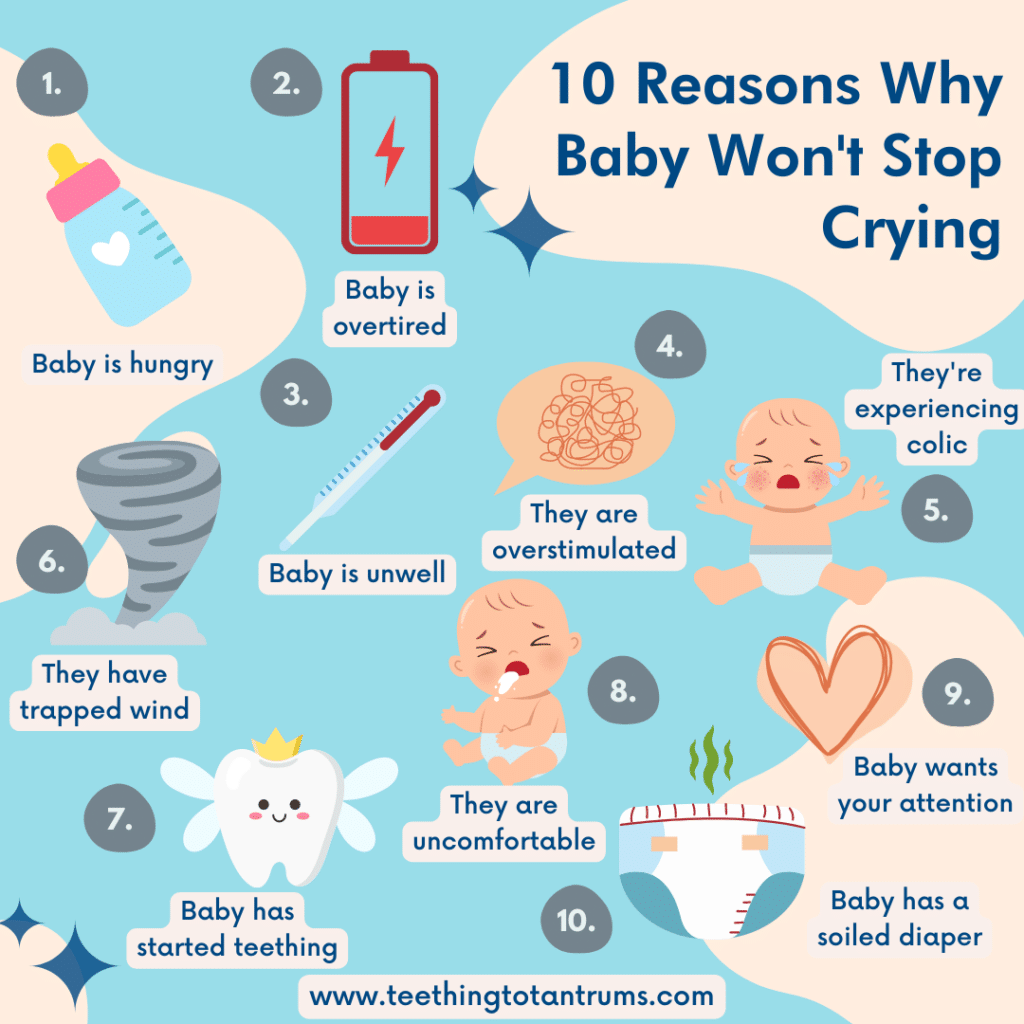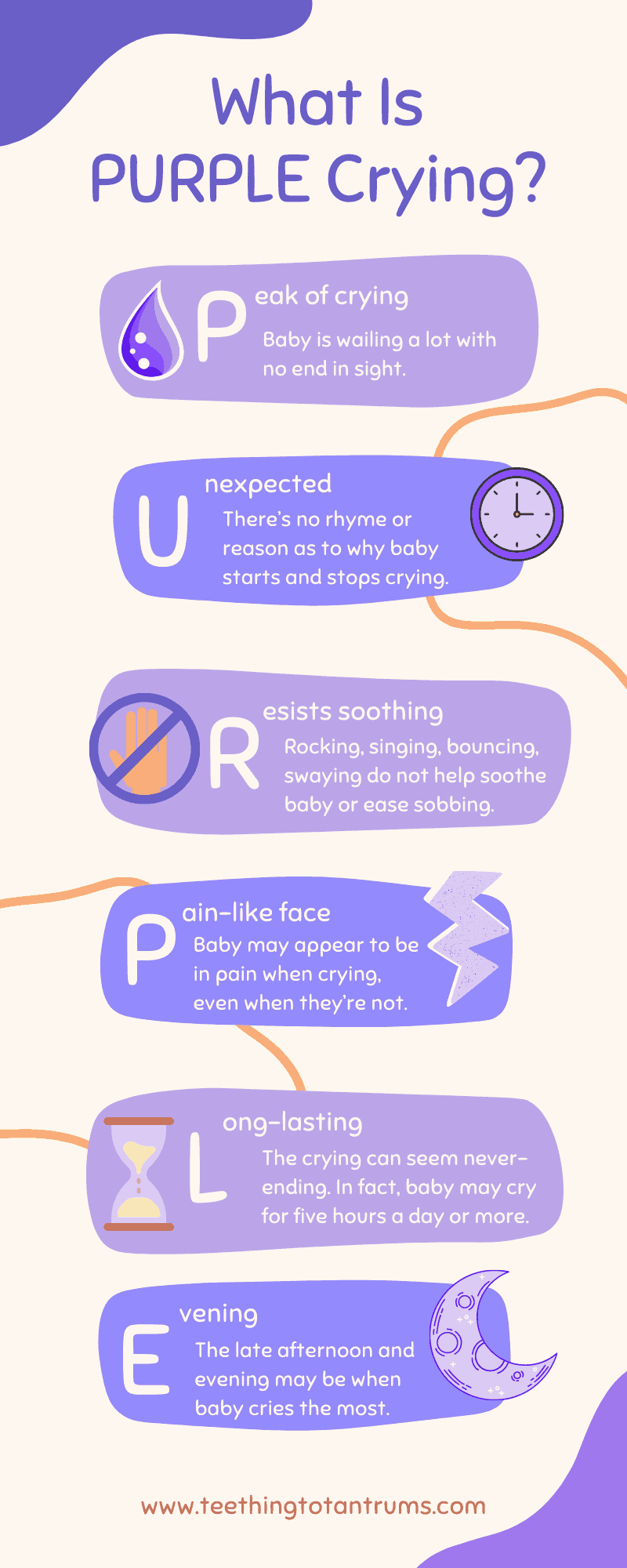So, you’ve had a great day with your little one. They’ve been fed, changed, and showered with love. But suddenly, your baby won’t stop crying and nothing seems to calm them down.
What could be causing this inconsolable crying? Join us as we explore the possible reasons behind your baby’s tears and share some expert tips to help you soothe your little one.
Common Reasons Why Baby Won’t Stop Crying
Babies cry to let you know what they need. It is their form of communication.
However, there are some instances when your baby will cry more incessantly and be more difficult to soothe.
So, here are some of the most common reasons babies won’t stop crying and when it can be more difficult to calm them down.

1. Baby Is Hungry
A hungry baby is not a happy baby. In the early months, all baby will do is feed, sleep and poop.
So make sure they are eating enough during a feed and if they’re struggling to keep food down… try feeding little and often.
2. Baby Is Unwell
Your little one may be inconsolable if they are feeling unwell.
While some babies become lethargic when they are feeling under the weather, others may cry incessantly (especially if they are in pain or discomfort).
3. Baby Is Overstimulated
An overstimulated young baby can easily get themselves worked up into a crying frenzy.
Therefore, it is important to ensure that your little one does not become overwhelmed by too much attention from family and friends in the early months.
The only way they can tell you they have had enough is by crying and they can easily get themselves worked up to the point where baby won’t stop crying as a result.
4. They Are Experiencing Colic
One of the biggest causes of persistent crying in young babies is colic.
A baby with colic is a tricky situation and can be very difficult for both baby and parents to handle. If you suspect your baby has colic, read this article for more advice.
5. They Have Trapped Wind
Trapped wind will often mean your baby won’t stop crying until the wind is released! This tension inside baby can be very uncomfortable so try ‘leg-cycling’, tummy massage and back patting to help.
6. Baby Has Started Teething
Although this will affect older babies, teething can mean baby won’t stop crying for long periods of time and they can be very difficult to settle and console.
To learn more about teething, check out the following post – Teething: The Ultimate Guide.
7. They Are Uncomfortable
If your baby is too hot, too cold or finding their clothing too itchy, they will let you know by the only way they know how… Crying.
In these cases, you will need to become a bit of a detective to work out what is going on with your little one.
If you think that the room temperature is fine, check for chafing from what they are wearing and make sure their fingers and toes are all free.
Read my post How To Dress Baby For Sleep to learn more.
TOP TIP: Use nighttime nappies that can absorb more so that your baby is more comfortable at night. This can often help them sleep better.
8. Baby Wants Your Attention
We are the centre of our baby’s world. Everything they need comes from us. Some babies will cry because they want us. Our warmth, our smell, our touch and our love.
9. Baby Has A Soiled Diaper
The feeling of dirty diapers is not a pleasant one. Your baby may be letting you know that they feel soiled and damp.
Even if you’ve just changed their diaper, do one quick check for a wet diaper to be sure.
10. Baby Is Overtired
Having an overtired baby is not a fun situation to find yourself in… If you miss their sleep cues, your baby may spiral out of control and be very difficult to calm down.
Bizarrely, an overtired baby will not settle to sleep quickly or easily so not letting them get overtired is key.
Read my posts Why Does My Baby Fight Sleep and Overtired Baby to learn more.
Looking to get your little one to sleep quickly and effortlessly? Check out my Bedtime and Nap Cheat Sheet and master the art of making daytime naps and bedtimes as seamless as possible.
A bedtime & nap cheat sheet so good your little one will ask you to put them to bed...
Laura Williams "This is a life saver! I'm so glad I downloaded your bedtime & nap cheat sheet. My little one actually asked me to put him to bed last night! Unbelievable! Thank you so much!"
Click Here For The FREE Cheat Sheet
Solutions For When Baby Won’t Stop Crying
So now that we have looked at the possible causes of your baby’s non-stop crying, what can you do to help them calm down?

- If you’re feeding, let your baby suckle at your breast or on the bottle. If not, give them a finger or pacifier to suck on.
- Having some gentle noise in the background may help distract your baby from crying and reduce loud background noises.
- Some older babies like to use a bit of cloth or a blanket as a comforter. A well-loved muslin or cuddly toy works wonders.
- Hold your baby or put them in a sling so they’re close to you. Move about gently, sway and dance, talk to them and sing.
- Stroke your baby’s back firmly and rhythmically, holding them against you or lying face downwards on your lap. This can help relieve gas and ensure your baby feels your presence.
- Get out and about. Rock your baby backwards and forwards in the pram, go out for a walk with your little one in a baby carrier or head out a drive. Try to limit how long your baby sleeps in a car seat to up to 30 minutes for newborns and up to 2 hours for babies…. And even if your baby wakes up again when you stop, at least you’ll have had a break from the constant crying.
- Find something for them to listen to or look at. This could be an audiobook, music on the radio, a favourite CD, a rattle, or a mobile above the cot, like this one:
- Try giving baby a warm bath. This will calm some babies instantly, but makes others cry even more. So give it a try, but don’t worry if it doesn’t work for your little one.
- After a bath, try massaging your baby gently and firmly. Avoid using any oils or lotions until your baby’s at least a month old. Talk soothingly as you do it and keep the room warm enough.
If these solutions don’t work, you can try following Harvey Karp’s 5 S’s to soothing a crying baby:
Harvey Karp’s Soothing 5 S’s
Sometimes despite all your best efforts to work out why your baby is crying, they may get themselves worked up to a point where you feel at a complete loss as to what to do to calm them and baby won’t stop crying…
If this happens… try the calming method devised by Pediatrician Harvey Karp called the 5 S’s:
1. Swaddle Baby
Most babies love to be swaddled. Swaddling makes them feel secure and reminds them of their days in the womb.
Therefore, the first step to soothing your crying baby is to wrap them in a snug (but not too tight) swaddle. I love the HALO swaddles:
With soft, plush micro-fleece, this super soft swaddle wraps newborns in just the right amount of warmth. This sleep sack swaddle suits infants from birth to potentially 3 months, offering both comfort and safe sleep practices with its arm immobilization feature.
The innovative 3-way swaddling system adapts to a baby's sleep style, a crucial feature for those restless nights. Whether it's arms in, hands-to-face, or arms out, it grows with the baby's swaddling needs!
Meanwhile, the bottom zipper makes midnight diaper changes a breeze!
2. Side Or Stomach Position
Hold your baby on their side or on their tummy over your arm. Both positions are comforting for babies, especially for babies with tummy and wind issues.
3. Shush In Baby’s Ear
When baby won’t stop crying, make a gentle shushing sound directly into your baby’s ear, which is similar to the constant sound they heard in the womb.
White noise machines have a similar effect, but your voice will also be very comforting when baby won’t stop crying. You can try singing a gentle song to them too.
White noise machines are a game-changer for your little one's sleep and having one that plays all night is a must. With a long-lasting battery, this compact and stylish white noise machine contains 21 non-stop relaxing noises, which will lull your little one to sleep night after night, no matter where you are!
4. Swing Baby Back and Forth Gently
Babies are used to these types of motions from their time in the womb and often don’t like the stillness they experience after birth.
Therefore, try gently swinging or jiggling your baby to get them to calm down.
Be careful to always support their head and neck when doing so.
NOTE: I find that putting a baby over my shoulder with one hand on the back of their head and jiggling them up and down or moving from side to side as I walk around the room often helps to calm them down when they won’t stop crying.
5. Suck On A Pacifier or Finger
Once your baby has calmed down a bit, sucking will often comfort them. Offer a pacifier, your finger or try to feed baby (bottle or breast).
These cute dishwasher-safe orthodontic pacifiers have a teat that is designed to allow for a natural sucking motion, reducing pressure on the jaw and teeth, and preventing teeth misalignment! Their heart-shaped shield also fits perfectly under baby’s nose for easy breathing making them the perfect pacifier for your baby!
But if these tactics don’t work…
What Do I Do If Nothing Works?
It is very distressing when baby won’t stop crying…
Even with all the training and experience I have had, I know how helpless and frustrated you can feel when you have a baby that just won’t stop crying.
Honestly, it’s heartbreaking.
And I feel so deeply for you.
So, if you feel you are at the end of your tether…
Then you need to place your baby in a safe place such as their crib and leave them for a few minutes.
Make yourself a cup of tea or coffee, take some deep breaths and call a friend or relative for a supportive chat.
You can then return to your baby with a better mindset to cope with calming them down.
REMEMBER: Never shake your baby. If you feel you are at breaking point, put your baby down safely in their crib, walk away and call someone.
Helplines For Extra Support
In the UK if you are struggling when baby won’t stop crying you can contact the Cry-Sis Helpline on +44 (0)800 448 0737 open 9am-10pm seven days a week.
Cry-Sis can put you in touch with parents of babies who have been in the same situation.
In the U.S, call the Crying Baby Hotline at 1-866-243-2229 or the Fussy Baby Warmline at 1-888-431-BABY to talk to health professionals.
They too will be able to support you through this trying time.
And no matter where you are, know that there are parents everywhere who have been through this too and there are people to help you.
So don’t be afraid to ask for help.
You are not a failure.
You are doing the best for yourself and your baby.
NOTE: You can also contact these helplines if you are struggling with postpartum depression and need some extra support to handle your baby’s crying.
What Do We Mean By Excessive Crying?
All babies cry. So what’s the difference between a baby who cries, a baby who won’t stop crying and a baby when tears turn into a full-blown uncontrollable wail?
Well, interpreting your baby’s crying is one of the first things new parents learn…
Babies have several different cries depending on their needs and crying is the way in which your little one communicates with us.
Therefore, when it gets out of hand or becomes non-stop, your baby is REALLY trying to tell you something.
So, what is classed as excessive crying and when should you be concerned?
Well, it’s perfectly normal for a young baby to cry for 1-3 hours per day.
In the early days, they may not cry much at all as they are still waking up to the world, but soon they will want to make their presence known and the only way they can do that is to cry.
Most infant crying stops once you see to their needs… But in extreme cases, your baby won’t stop crying no matter what you do.
In this case, they may be experiencing what is known as PURPLE crying.
PURPLE Crying
Doctors came up with PURPLE crying to help parents deal with the stages of excessive crying that occurs in infants during the first 4 months of their lives by helping them understand that all babies go through the Period of PURPLE Crying.

- Peak of crying. Baby is wailing a lot. The most crying may happen in baby’s second months of life, with less crying by three to five months of age.
- Unexpected. There’s no rhyme or reason as to why baby starts and stops crying.
- Resists soothing. Rocking, singing, bouncing, swaying – you may not be able to do anything, to help soothe baby and ease the sobbing.
- Pain-like facial expressions. Baby may appear to be in pain when crying, even when they’re not.
- Long-lasting. The crying can seem never-ending. In fact, baby may cry for five hours a day or more.
- Evening. The late afternoon and evening may be when baby cries the most. Often called a witching hour.
However, if your baby won’t stop crying for more than 3 ½ hours per day regularly, there may be an underlying cause for concern and you should always go with your gut feeling.
To learn more about PURPLE Crying, click here to visit the Purple Crying Website.
When To See A Doctor
If your baby has been crying constantly for more than 2 to 3 hours and NONE of the normal remedies for calming them has worked… then you should consult a doctor.
In addition to excess crying, if baby displays any of the following symptoms you should also seek IMMEDIATE medical advice:
- High fever but hands and feet are cold
- Has a spotty purple-red rash anywhere on the body
- Has a seizure or convulsion
- Has pale skin or blue, mottled skin
- Is breathing rapidly
Trust your instincts.
You will know the difference between a fussy baby and excessive crying which is cause for concern.
Baby Won’t Stop Crying Recap
Dealing with a non-stop crying baby is tough.
It can be totally overwhelming and it will have you questioning what you are doing wrong as a parent.
However, it is important to remember you are not alone.
Most babies will go through a period of excessive crying in the early weeks and the good news is that after 6 weeks of age, these bouts of crying usually start to occur less often.
Remember that crying is your baby’s only way of communicating their needs in the early months so it is up to us to work out what they need.
As you get to know baby more, you will probably find that they cry less as you will become more aware of situations that prompt excessive crying.
Whatever the reason why baby won’t stop crying, hang on to the fact that time is on your side and that this will get better. Even a colicky baby will eventually get better and cry less as they grow older!
And finally, if you are really struggling, ASK FOR HELP.
A constantly crying baby, no matter what the cause, is very difficult to deal with and you will need a break, so share the load.
Need More Parenting Help?
- Download our FREE Perfect Sleep Cheat Sheet. It’s a free, easy-to-use and proven formula designed for parents of 0-5 year olds to master the art of consistently undisturbed and restful sleep without the yelling, nagging or exhausting long-winded evenings.
- Check out our Parenting Toolbox. You’ll get access to expertly-chosen products that you can guarantee are the best for your little one and your wallet.
- Ready to create the calm, peaceful evenings you deserve? Then checkout our most popular course - The Bedtime Battles Masterclass

A bedtime & nap cheat sheet so good your little one will ask you to put them to bed...
Laura Williams "This is a life saver! I'm so glad I downloaded your bedtime & nap cheat sheet. My little one actually asked me to put him to bed last night! Unbelievable! Thank you so much!"
Click Here For The FREE Cheat Sheet





